As Long As Women Are Not Free, Iran Will Not Be Free - Exiled Prince
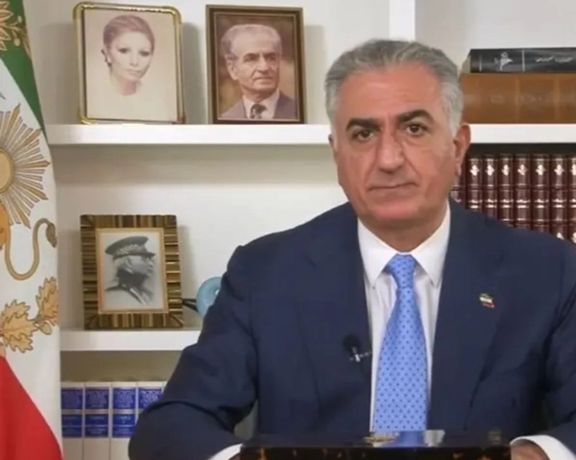
Iran's exiled Prince Reza Pahlavi says as long as Iranian women are not free, Iran will not be free, calling on men to be in the front lines in this struggle to support women.

Iran's exiled Prince Reza Pahlavi says as long as Iranian women are not free, Iran will not be free, calling on men to be in the front lines in this struggle to support women.
In a tweet on Monday, Pahlavi highlighted “43 years of Iranian women’s fight to reclaim their obvious and basic rights,” especially the freedom to choose what to wear.
“Iranian men should also stand shoulder to shoulder with women in the front lines of this struggle,” he added in his post that ended with a hashtag to support Iranian women who are protesting against the compulsory Islamic dress code or hijab.
Social media posts from Iran indicate many women left home Tuesday without hijab in response to calls from activists to defy the government’s forced dress code.
Women’s rights and political activists had called for civil disobedience on July 12 with the hashtag of ‘No2Hijab’ in response to a government announcement for a day of ‘hijab rallies’ at stadiums and other venues “to honor, celebrate, and promote” the Islamic notion of the hijab (cover) for women.
For the past few weeks the government has increased harassment of women for their insufficient hijab and many have been detained by special police patrols. This has led to more tension amid economic hardship for 90 percent of the population on fixed income, while inflation has reached 55 percent and food prices have risen by more than 80 percent, according to May-June official reports.
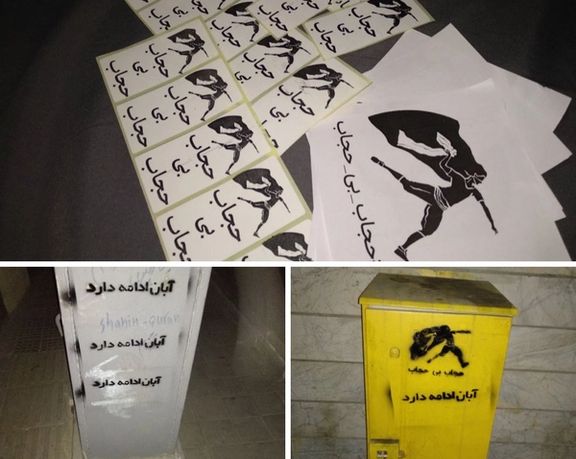
Social media posts from Iran indicate many women left home Tuesday without hijab in response to calls from activists to defy the government’s forced dress code.
Women’s rights and political activists had called for civil disobedience on Tuesday (July 12) with the hashtag of ‘No2Hijab’ in response to a government announcement for a day of ‘hijab rallies’ at stadiums and other venues on Tuesday “to honor, celebrate, and promote” the Islamic notion of the hijab (cover) for women.
So far it is not clear what is the extent of the defiance, but dozens of women have posted photos on social media showing they are outside without a headscarf and mostly dressed in white, instead of the dark colors the government enforces.
Another woman posted her photo without a headscarf in the street and simply tweeted, "The good feeling of freedom - NO2Hijab".
A university student posted her photo without a headscarf, saying after calsses we went into the street with hijab, walked "and we really enjoyed it."
Another young woman tweeted that she left her gym and was riding home without a headscarf and decided not to wear a helmet, which she usually wears to avoid the hijab. She passed a 'morality police' van on the street that stops women for "bad hijab", but they did not stop her.
There are still no reports of any incidents, but the day is not over and some women accompanied by male family members might go into streets in the afternoon.
A father accompanied her daughter to the building of the Basij militia where she took off her headscarf and shouted, "No to forced hijab, No to the Islamic Republic."
For the past few weeks the government has increased harassment of women for their insufficient hijab and many have been detained by special police patrols. This has led to more tension amid economic hardship for 90 percent of population on fixed income, while inflation has reached 55 percent and food prices have risen by more than 80 percent, according to May-June official reports.
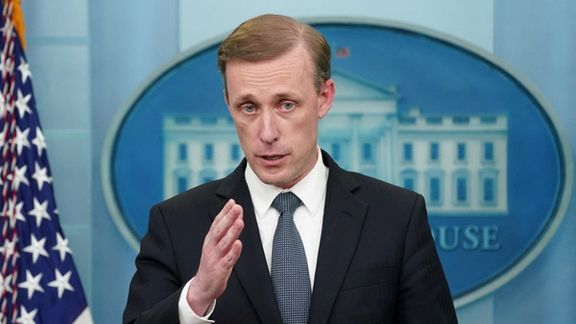
Iran has rejected criticism by President Joe Biden, insisting it is the most stabilizing regional force, as Washington says Tehran may deliver drones to Russia.
Iran’s foreign ministry spokesman Nasser Kanan responded on Tuesday to an opinion article Biden published in the Washington Post July 9, where he said the US will increase pressure on Tehran until it agrees to restore the 2015 nuclear deal known as JCPOA.
“Emphasis by Mr. Joe Biden to continue the economic and diplomatic maximum pressure policy on Iran contradicts America’s stated goal to restore the 2015 agreement and follows the failed path of the Trump administration against the Islamic Republic of Iran.”
Meanwhile US National Security Adviser Jake Sullivan Monday said that Russia wants to obtain hundreds of drones from Iran, both for surveillance and attack, to use in its war in Ukraine.
He said the US has information that Iran is preparing to train Russian personnel to use its drones perhaps as early as this month, but it is not clear if any UAVs have been delivered to Russia.
“Our information indicates that the Iranian government is preparing to provide Russia with up to several hundred UAVs, including weapons-capable UAVs on an expedited timeline,” Sullivan told reporters at the White House, referring to unmanned aerial vehicles.
This is not the first time that the possibility of Iranian weapons going to Russia has come into the open since the invasion of Ukraine began. The Guardian reported April 12 that according to members of Iranian-backed Iraqi militias and regional intelligence services Russia was receiving munitions and military hardware sourced from Iraq, with the help of Iranian weapons smuggling networks.
The report also said that Iran provided a Bavar 373 missile system, similar to the Russian S-300 to Russia and returned an S-300. The Guardian quoted a source “who helped organise the transport.”
The Russian embassy in Tehran denied that Iran was involved in supplying weapons from Iraq to Russia. “The information that appeared in some media about the supply of Iranian weapons to Russia is fake and does not correspond with reality,” the embassy said in a tweet on April 24.
While the Iranian foreign ministry spokesman responded to Biden’s op-ed, he did not mention Sullivan’s accusation of drone transfers to Russia. Some government-controlled media did carry the news about the remarks but did not mention any official reaction on Tuesday.
Iran has not condemned Russia’s invasion and has only called for diplomacy to end “the conflict”. Media in Tehran do not use the word invasion when talking about the war.
The US accusation will have repercussions within Iran’s political scene. Many former officials and pundits have been criticizing Tehran’s close ties with Moscow and its reliance on Russia while nuclear talks with the United States have stalled.
Iran’s economy is in crisis as US sanctions continue and critics say that instead of a deal with Washington, the government increasingly draws closer to Moscow.
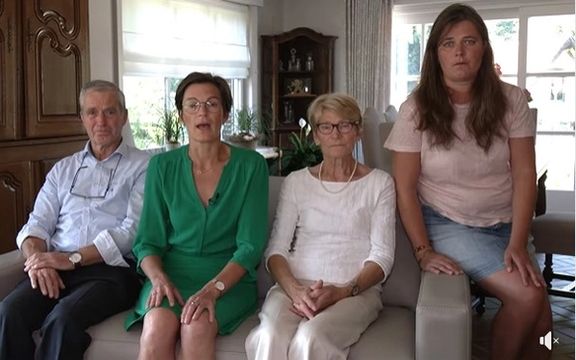
The family of the Belgian aid worker being held in Iran has pleaded to their government to do “everything necessary” to secure his release.
In a video message released on Monday, Olivier Vandecasteele’s family said “Even though he’s innocent, he has been rotting away for nearly five months in total solitary confinement.”
“Today Olivier needs your support... It is unthinkable for our family that our democratic Belgium isn’t doing everything necessary to get innocent prisoners out of countries like Iran,” his sister Nathalie said in the video.
She said her brother had received two consular visits that revealed he suffered major weight-loss and a foot infection, adding that “He has spent two months without even a mattress, in a cell lit up around the clock, and being subjected to daily psychological pressure from interrogators.”
Imploring authorities to get Olivier freed, his mother, who barely manages to fight back tears, said, “Since he finished his studies, he has been far from us to help others. Now, help us to get him out of there and bring him home so we can hug him close.”
Numerous people and groups from around the world have been warning about a prisoner exchange treaty between Belgium and Iran that was passed by the Belgian parliament’s foreign relations committee and will go to the full 150-member chamber July 14.
A draft law could lead to the release of Assadollah Assadi, an Iranian diplomat serving a 20-year prison sentence in Belgium for planning a terror attack in Paris four years ago.

The Cannes Film Festival has called for the immediate release of filmmakers Mohammad Rasoulof, Mostafa Alehahmad and Jafar Panahi, detained by Iran in recent days.
In a statement released on Monday, Cannes organizers said, “The Festival de Cannes strongly condemns these arrests as well as the wave of repression obviously in progress in Iran against its artists.”
Panahi, who has won numerous awards, including the Golden Leopard at Locarno Festival, the Golden Lion in Venice, and the Silver Bear at the Berlinale, was arrested Monday as he was protesting the detention of two other award-winning filmmakers Mohammad Rasoulof and Mostafa Alehahmad.
“We are deeply concerned about the arrest of Mohammad Rasoulof and Mostafa Al-Ahmad. It’s shocking that artists are taken into custody because of their peaceful endeavors against violence,” Berlinale organizers said.
Rasoulof – another prominent filmmaker with several international awards such as the Golden Bear – and Alehahmad – who is known in international film galas for his short works -- were arrested July 8 as part of the Iranian crackdown on the signatories of a collective statement titled “Lay down the gun” issued by more than 100 film industry personalities in the end of May.
The statement called on military and security forces who “have become tools for cracking down on the people,” not to suppress protesters during a wave of protests across Iran that were triggered when a 10-story building collapsed in Abadan, leaving at least 40 people dead and dozens missing.
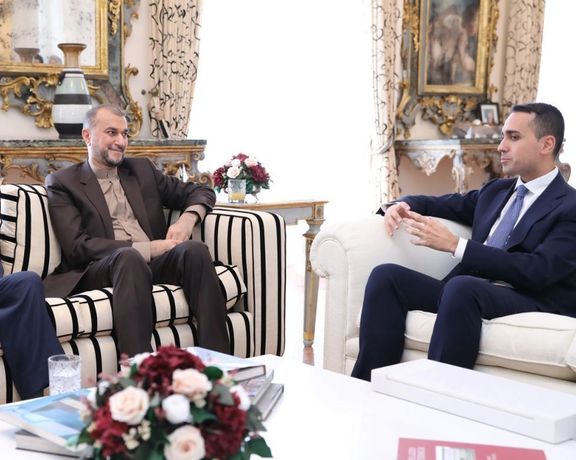
The Iranian foreign minister, who has traveled to Italy, says the Islamic Republic seeks to have its share in the energy market, and reviving the nuclear deal should guarantee it.
Hossein Amir-Abdollahian made the remarks during a meeting with his Italian counterpart Luigi Di Maio in Rome on Monday. “Pursuing political, economic and commercial cooperation is one of the main goals of this trip,” he said upon arrival.
In the meeting, the Iranian diplomat said, “We want the JCPOA to work well. We seriously want a good and lasting agreement and we believe that Iran should be able to take full economic benefit from the JCPOA. The US should understand this fact well regarding guarantees.”
According to Iranian media, Di Mario noted that Italy is ready to play a positive role in the negotiations for the return of all parties to the JCPOA.
The visit comes as the efforts – mainly by the European Union -- to kickstart the stalled Vienna negotiations to restore the 2015 nuclear deal known as the JCPOA keep failing. The latest effort was the proximity talks in Qatari capital Doha on June 28-29, which ended without any progress. The US said that Iran did not show serious intent to move forward in the talks.
Later in the day, Amir-Abdollahian tweeted that “if the window of diplomacy is still open, it’s because of Iran's dynamic initiatives,” noting that the US cannot impose its one-sided views through accusation and sanctions. “Diplomacy is not a one-way street. Reaching the final deal needs the US' acceptance of realities, flexibility and initiatives.”